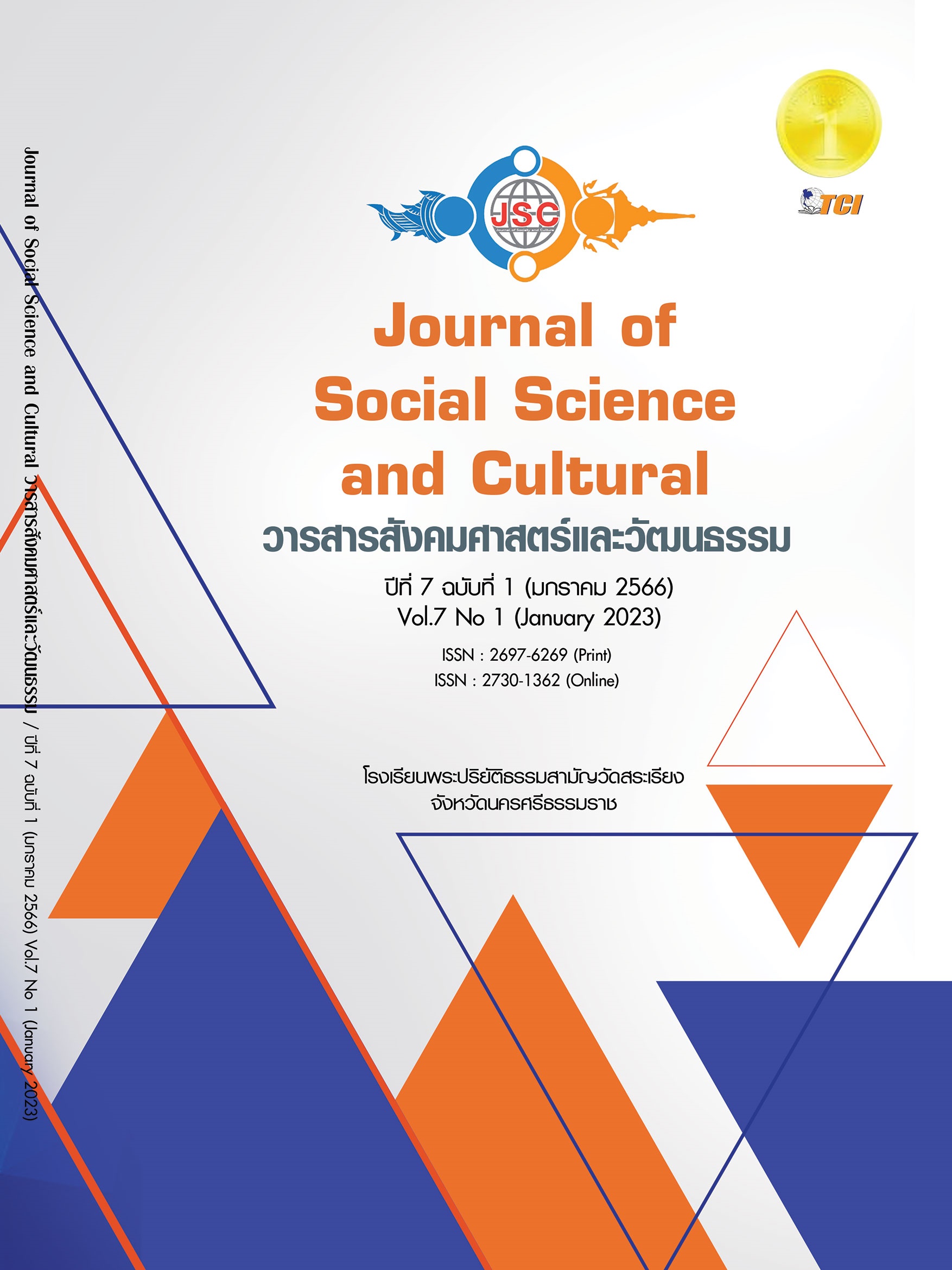DEVELOPING LEADERSHIP COMPETENCY TO PROMOTE SMART TOURISM: A CASE STUDY OF TOURISM COMMUNITY IN THE UPPER CENTRAL REGION
Main Article Content
Abstract
The objectives of this research were 1) to study the leadership competencies to promote smart tourism, 2) to analyze the needs for developing leadership competencies to promote smart tourism, and 3) to develop a plan for developing leadership competencies to promote smart tourism: a case study of tourism community in the upper central region. The research design was an exploratory sequential mixed-methods approach. The population for the qualitative research included tourism academics, information technology academics, and leaders of successful tourism community enterprises was 15 people. The sample for the quantitative research was 133 leaders of the OTOP tourism community in the upper central region. The qualitative research tools were In-depth interview form and the quantitative research tool was the needs assessment form. The qualitative data were analyzed using content analysis, and the quantitative data were analyzed using descriptive statistics, including the mean, standard deviation, and the Modified Priority Needs Index (PNIModified). The research results found that 1) the leadership competencies were divided into two parts: the hidden competency, which consisted of motives, traits, and self-image, and the visible competency, which consisted of knowledge and skills., 2) the highest the Modified Priority Needs Index (PNIModified). of competencies was motive, followed by skills and knowledge, and 3) a plan for developing leadership competencies to promote smart tourism consisted of leadership competency development guidelines emphasizing development processes, assessment, and systematic competency enhancement. Competency development methods rely on a variety of methods or tools, divided into two main categories: Training tools and Non-Training tools and projects under the competency development plan, that would make tourism community leaders think and act. It can help increase the competency of community tourism leaders.
Article Details
References
กรมพัฒนาชุมชน กระทรวงมหาดไทย. (2561). คู่มือบริหารโครงการชุมชนท่องเที่ยว OTOP นวัตวิถี. เรียกใช้เมื่อ 3 กรกฏาคม 2565 จาก http://oic.go.th/FILEWEB/CABIN FOCENTER3/DRAWER051/GENERAL/DATA0000/00000042.PDF
กองส่งเสริมวิสาหกิจชุมชน กรมส่งเสริมการเกษตร. (2564). รายชื่อวิสาหกิจชุมชน /เครือข่าย) วิสาหกิจชุมชน. เรียกใช้เมื่อ 3 กรกฎาคม 2565 จาก http://smce.doae.go.th /productcategory/SmceCategory.php
ข้าวขวัญ คุณวุฒิ และอารีย์ นัยพินิจ. (2560). ขีดความสามารถทางการแข่งขันด้านการตลาดการท่องเที่ยวของนครชัยบุรินทร์. วารสารวิทยาลัยบัณฑิตศึกษาการจัดการ มข, 10(1), 199-219.
เดือนเพ็ญ คำพวง และคณะ. (2559). กระบวนการสร้างเครือข่ายแหล่งท่องเที่ยวเชิงเกษตรอย่างยั่งยืน ในอำเภอปากช่อง จังหวัดนครราชสีมา. วารสารวิชาการท่องเที่ยวไทยนานาชาติ, 12(10), 65-90.
เบญจา ยอดดำเนิน - แอ็ตติกจ์ และกาญจนา ตั้งชลทิพย์. (2552). การวิเคราะห์ข้อมูลเชิงคุณภาพ: การจัดการข้อมูล การตีความ และการหาความหมาย. กรุงเทพมหานคร: ชีโน พับลิชชิ่ง (ประเทศไทย).
เพชรศรี นนท์ศิริ. (2555). รูปแบบการดำเนินงานของกลุ่มท่องเที่ยวโดยชุมชนในเขตภาคเหนือตอนล่าง. วารสารวิชาการการท่องเที่ยวไทยนานาชาติ, 8(2), 47-65.
รัฐนันท์ พงศ์วิริทธิ์ธร และภาคภูมิ ภัควิภาส. (2558). การตลาดสำหรับการจัดการท่องเที่ยวในจังหวัดเชียงใหม่ เพื่อสนองความต้องการของนักท่องเที่ยวชาวจีน. วารสารวิชาการมหาวิทยาลัยฟาร์อีสเทอร์น, 8(2), 62-72.
สุภางค์ จันทวานิช. (2553). วิธีการวิจัยเชิงคุณภาพ (พิมพ์ครั้งที่ 18). กรุงเทพมหานคร: โรงพิมพ์แห่งจุฬาลงกรณ์มหาวิทยาลัย.
สุวิมล ว่องวานิช. (2548). การประเมินความต้องการจำเป็น. กรุงเทพมหานคร: จุฬาลงกรณ์มหาวิทยาลัย.
Bass, B. M. (1985). Leadership and performance beyond expectations. New York: The Free Press.
Boes, K. et al. (2015). Conceptualising smart tourism destination dimensions. In I. Tussyadiah & A. Inversini (eds.), Information and communication technologies in tourisms (pp. 391-403). London: Springer International Publishing.
Creswell, J. W. (2009). Research design: Qualitative, quantitative, and mixed methods Approaches (3rd ed.). Thousand Oaks, CA: SAGE.
Goodwin, H. & Santilli, R. (2009). Community-based tourism: A success. Retrieved July 3, 2022, from http://www.andamandiscoveries.com/press/press-harold-goodwin.pdf
Gretzel, U. et al. (2015). Smart tourism: Foundations and developments. Electron Markets. 25(September), 179-188.
Haven-Tang, C. & Jones, E. (2012). Local leadership for rural tourism development: A case study of Adventa, Monmouthshire, UK. Tourism Management Perspectives, 4(October), 28-35.
Kontogeorgopoulos, N. et al. (2014). Success factors in community - based tourism in Thailand: The role of luck, external support, and local leadership. Tourism Planning & Development, 11(1), 106-24.
Lee, P. et al. (2020). Smart tourism city: Development and transformations. Sustainability, 12(10), 3958.
Neuman, W. L. (2006). Social research method: Qualitative and quantitative approaches (6th ed.). Boston: Pearson International Edition.
Sawatsuk, B. et al. (2018). Factors determining the sustainable success of community-based tourism: Evidence of good corporate governance of Mae Kam Pong homestay, Thailand. International Journal of Business and Economic Affairs (IJBEA), 3(1), 13-20.
Spencer, L. M., & Spencer, S. M. (1993). Competence at work: Models for superior performance. New York: John Wiley & Sons.
Zhu, W. et al. (2005). CEO transformational leadership and organizational outcomes: The mediating role of human-capital-enhancing human resource management. The Leadership Quarterly, 16(1), 39-52.


